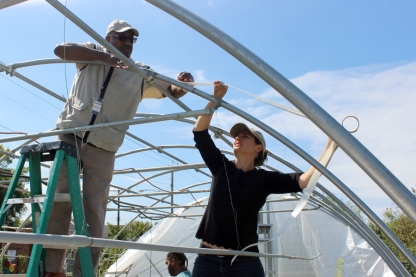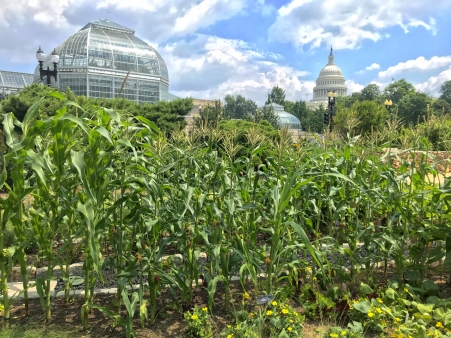To limit the risk of transmitting COVID-19 coronavirus, the United States Botanic Garden (USBG) has changed its operations. The Conservatory and gated outdoor gardens are temporarily closed to the public while Bartholdi Park and the Terrace Gardens remain open. Please monitor this website for updates to operating status. Many resources can be accessed online, including educational materials, virtual tours, informational videos, and our fall programs will all be online. Connect with resources from home at www.USBG.gov/AtHome.
Urban Agriculture at the U.S. Botanic Garden
Agriculture is the cornerstone of human survival. The more than 7.8 billion people alive in the world today depend on plants for food, clothing, shelter, energy, medicine, and other critical resources. Since the U.S. Botanic Garden's creation 200 years ago, one of the Garden's primary functions has been growing and demonstrating plants to tell the story of agriculture and economic plants to the public.
Connecting people and agriculture is a critical need given the lack of exposure to agriculture and food production for most Americans today and the great challenges that lie ahead in successfully feeding our growing populations. With ever more people living in urban areas, understanding agriculture through an urban lens can provide both a connection and an educational opportunity.
Using its urban setting and building on its long history of growing plants and educating people about them, the USBG is working to promote science and environmental learning through sustainable agriculture in urban settings; support health and wellbeing in urban communities by increasing food access through local food production; and foster community engagement through meaningful connections with food and agriculture. By building a network of organizations helping with food production and education across the country, the Garden is strengthening people's capacity to transform their lives, institutions, and communities through engagement in urban agriculture.
Read below to learn more about the U.S. Botanic Garden's urban agriculture work.
 Urban Agriculture Resilience Program
Urban Agriculture Resilience Program
The U.S. Botanic Garden partnered with the American Public Gardens Association (the Association) to offer immediate support to urban agriculture and other urban food-growing programs at public gardens affected by the COVID-19 pandemic. In June 2020, the USBG and the Association established the Urban Agriculture Resilience Program to grow capacity, prevent shortfalls, and gather best practices from established programs across the U.S. public garden community. The partnership made awards to 28 public gardens across the United States to help sustain urban agriculture and community food growing during this challenging time.
With the assistance of these funds, participating gardens in 19 states and Washington, D.C., are growing and distributing produce, especially to communities with food access challenges; maintaining and expanding urban agriculture and other food growing education programs; and promoting wellness and nutrition by educating the public about growing and consuming fruits and vegetables. Beyond offering immediate support, the Urban Agriculture Resilience Program will provide insight into successful approaches and future opportunities for public gardens to improve food access and advance food and agriculture education in urban communities.
See the awardees and learn more about their work:
Learn more at www.USBG.gov/UrbanAgricultureResilience
 Training Veterans in Urban Farming as a Career
Training Veterans in Urban Farming as a Career
The USBG and the National Center for Appropriate Technology (NCAT) have partnered to create week-long Armed to Urban Farm sustainable agriculture trainings for veterans and their farm partners. Armed to Urban Farm gives military veterans an opportunity to experience sustainable, profitable small-scale farming enterprises and learn about urban farming as a career. Armed to Urban Farm, which is based on NCAT's popular Armed to Farm program, combines engaging classroom sessions with farm tours and hands-on activities. Participants learn about business planning, budgeting, recordkeeping, marketing, urban soils, land access, vegetable production, and more. Participants gain a strong foundation in the basic principles of operating a sustainable farming enterprise. In addition, attendees join a nationwide network of supportive farmer-veterans and agricultural advisors.
Upcoming workshops
Baltimore, MD - postponed to 2021 [new date TBD]
Previous workshops: Cleveland - September 2019, Washington, D.C. - September 2018
Learn more about the Armed to Urban Farm program
Building Urban Ag Capacity at Public Gardens
The U.S. Botanic Garden has partnered with Chicago Botanic Garden's Windy City Harvest, an established urban agriculture program within the public gardens community, to develop a train-the-trainer program. This collaboration is providing hands-on, practical support for public gardens and their partner organizations interested in developing or expanding urban agriculture programming. Based on feedback from other gardens, the collaboration has designed and offered three-day intensive urban agriculture workshops for public garden professionals and their partners.
The workshops incorporate topics such as designing urban agriculture programs, developing community partnerships, selecting and establishing urban farm sites, cultivating donors and identifying funding opportunities, and evaluating and communicating program successes. Participants have firsthand experiences on urban farms and learn about tools and resources developed over nearly two decades of the Chicago Botanic Garden's work in urban agriculture.
Upcoming workshops
Check back for future workshops
Previous workshops: New Orleans - March 2020, Chicago - August 2019
 Greenhouse Manual and Trainings for Educators
Greenhouse Manual and Trainings for Educators
The U.S. Botanic Garden, the National Center for Appropriate Technology, and City Blossoms recognized the emerging need for user-friendly guidance on operating educational greenhouses and maximizing their potential in the school setting. To that end, the partners developed an introductory manual for educators wanting to better use new or existing greenhouses for programming. The manual clearly and concisely lays out a basic understanding of greenhouses, how to integrate them into lessons, and how to effectively use greenhouses in classroom curricula and out-of-school activities.
The manual includes lesson plans as well as basic information on layout and operations of a greenhouse, growing plants (especially during the school year), growing from seed, seedling nutrition, identifying and treating diseases, pest management in greenhouses, basic budgeting, and succession planting.
This useful resource will help facilitate transformative learning experiences in schools nationwide, while cultivating students' appreciation of the importance of plants.
Upcoming trainings
Check back for future trainings
Learn more about this partnership and manual
Report: The Role of Botanic Gardens in Urban Agriculture
The U.S. Botanic Garden (USBG) and the American Public Gardens Association undertook this study to identify viable urban agriculture program models that are self-sustaining and environmentally, socially, and economically enriching, and to better understand how public gardens could achieve meaningful impact. The Association used a three-pronged research approach to evaluate the state of urban agriculture at community-based nonprofit and for-profit organizations, government agencies, universities, and public gardens. Insights were gained by exploring literature, surveying the community of practice, and interviewing practitioners and experts about urban agriculture initiatives and related educational programming.
 Online Food and Agriculture Programs
Online Food and Agriculture Programs
As part of our ongoing educational programming, we offer periodic online programs about food and agriculture, including programs specifically focused on the urban environment.
Find upcoming programs at www.USBG.gov/OnlinePrograms
The USBG Kitchen Garden
The USBG Kitchen Garden demonstrates food growing in an urban setting, with tours, tastings, workshops, and children's activities . The fruits and vegetables from the Garden are used for educational classes and cooking demonstrations, and excess produce is donated to local community-based hunger relief organizations.

